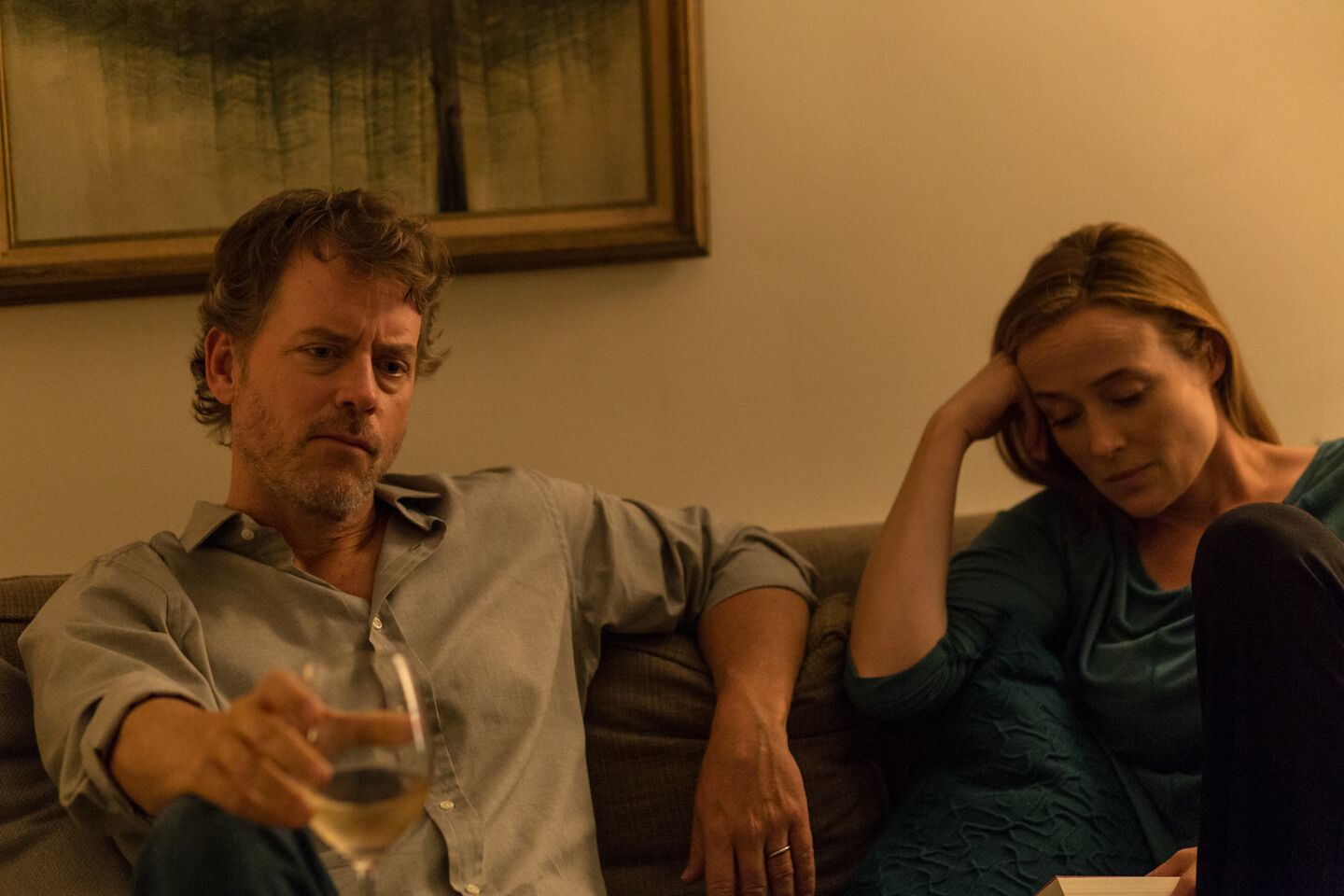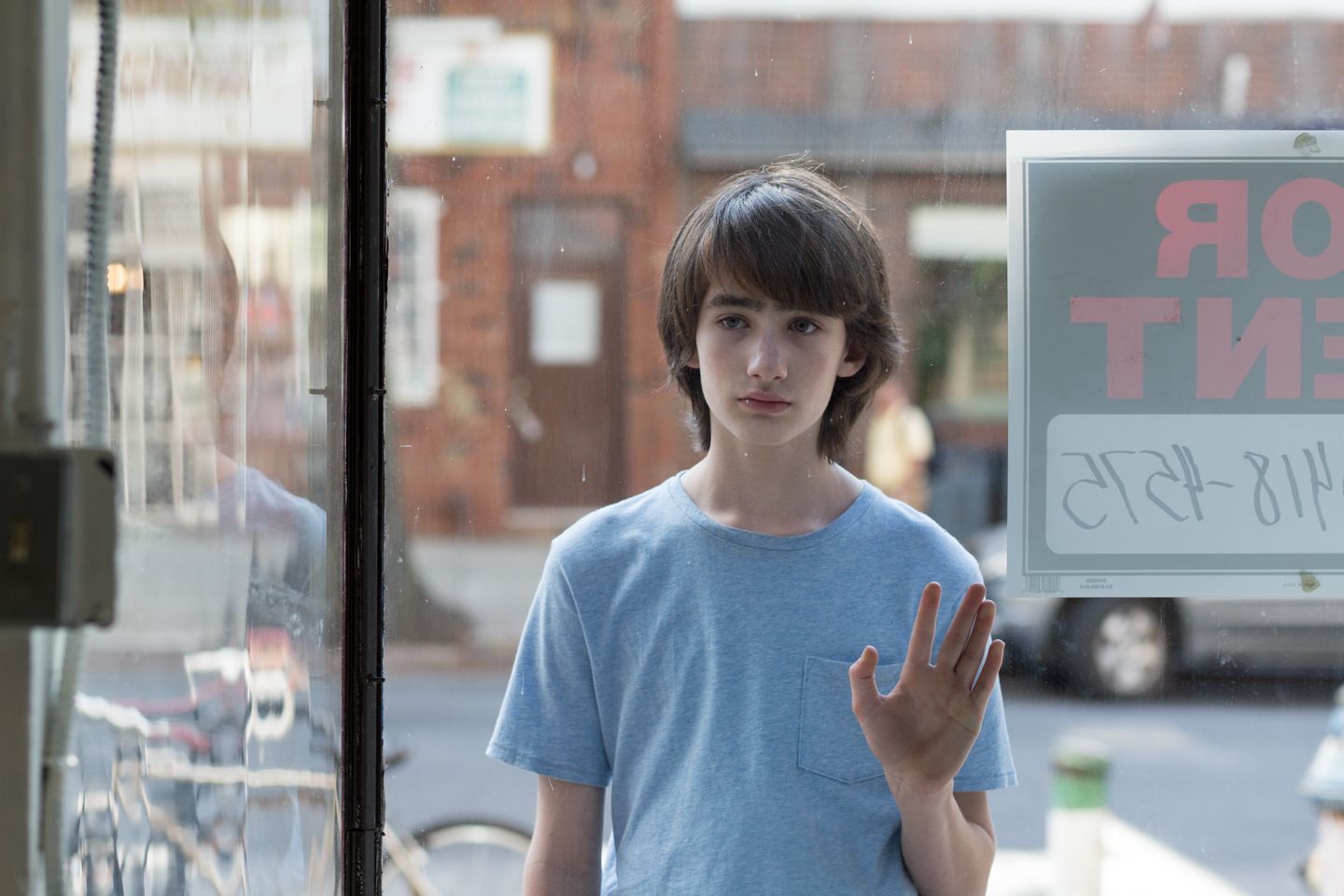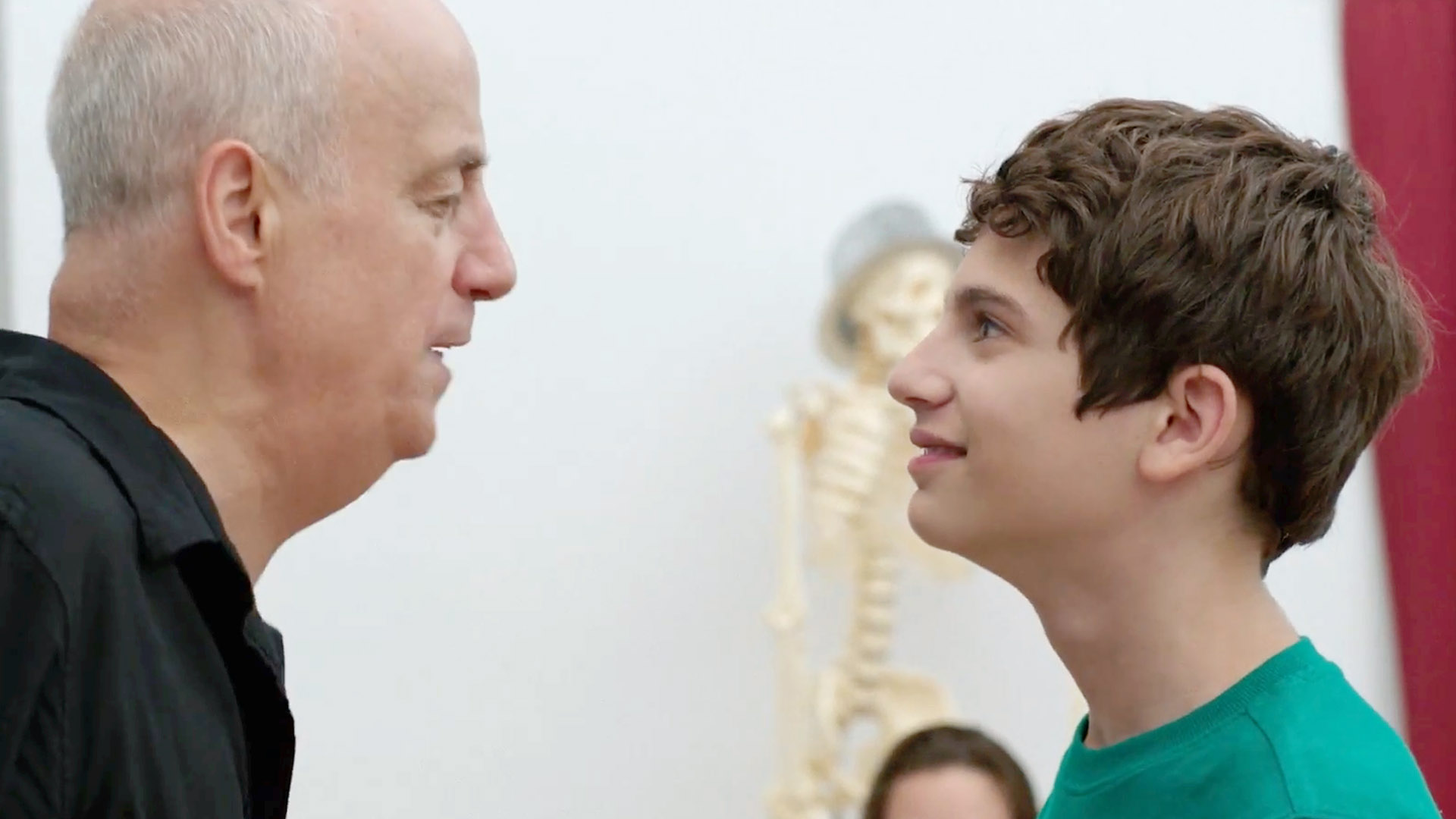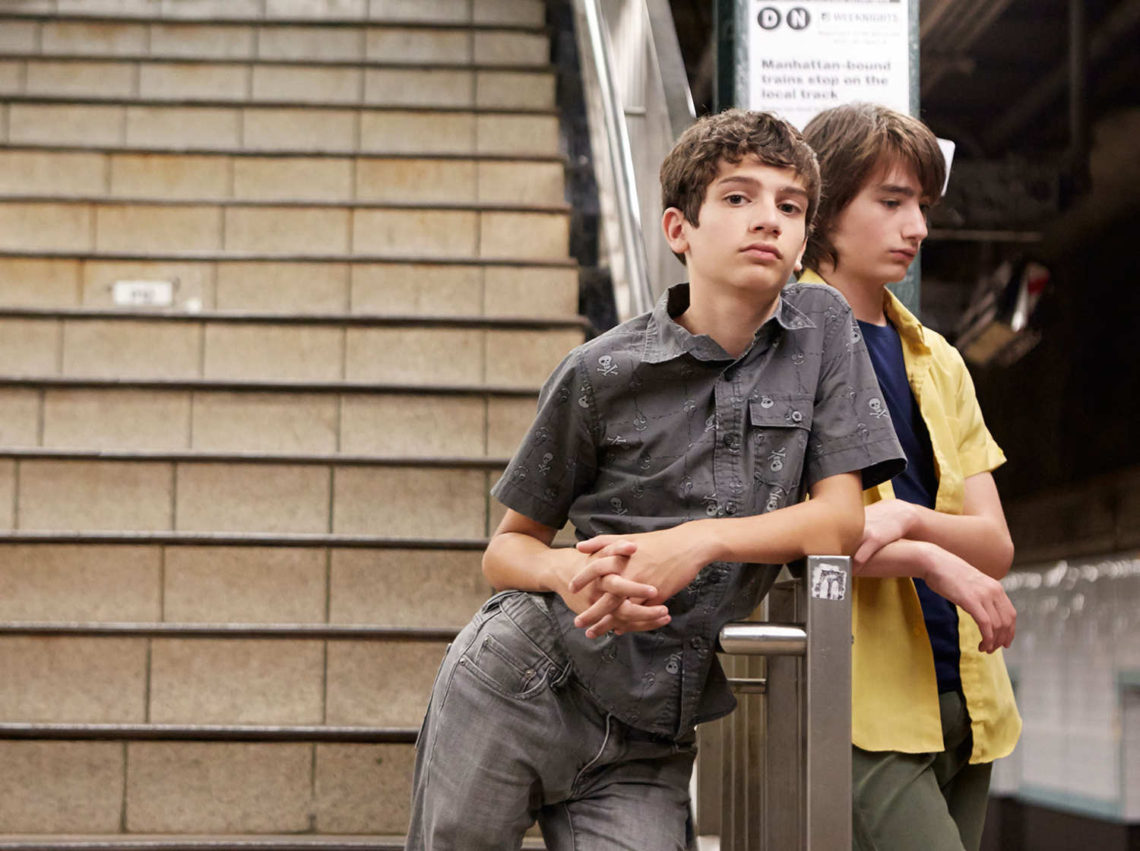Ira Sachs’s latest film, Little Men, is, after Keep the Lights On (2012) and Love is Strange (2014), his third straight feature set in New York City, and the second to make the gentrification occurring in this rapidly modernizing city a part of its narrative. However, it does mark a first for Sachs: as he directly tackles childhood, through the characters of Jake Jardine (Theo Taplitz) and Tony Calvelli (Michael Barbieri), both witnessing their parents—Jake’s parents, Brian (Greg Kinnear) and Kathy (Jennifer Ehle); and Tony’s Chilean immigrant mother, Leonor (Paulina García)—squabbling over a real-estate conflict in Brooklyn and reacting in their own mischievous ways. Ultimately, Little Men is simply another panel in what’s shaping up to be a remarkable filmography. From his 1998 debut The Delta onward, Sachs has made films noteworthy for their intimacy, humanism, and tough-minded wisdom, even as he focuses on difficult subjects: sexual coming-of-age (The Delta), a foreigner’s personal awakening (Forty Shades of Blue), marital infidelity (Married Life), painful romantic relationships (Keep the Lights On), and homelessness (Love is Strange). In Little Men, as is often the case in Sachs’s films, no one is totally right or wrong, and not everything will resolve neatly in the end.
On the occasion of the theatrical release of Little Men, Sachs sat down with Movie Mezzanine to discuss, among other topics, his cinematic and real-life inspirations for the film, his discovery of the two terrific young lead actors, and his views on how he maintains his empathetic perspective from film to film.

Movie Mezzanine: What’s the inspiration behind the story you tell in Little Men?
Ira Sachs: I wanted to make a film about childhood, and I wanted to make a film for kids and adults that somehow included the beauty of cinema, if that makes sense…
What do you mean by that?
I just mean that I believe there is something joyous about childhood that cinema is particularly able to capture, of both the exuberance as well as the pain. And so there are films like The 400 Blows or The Red Balloon or Kes or a number of movies that I think also very gently introduce cinematic storytelling to the equation.
I remember thinking, when I watched Little Men, of Ozu…
Yeah, I was specifically inspired by I Was Born, But… and Good Morning.…They are both wonderful films, and…about six years ago now, when [co-writer/frequent collaborator Mauricio Zacharias and I] first started working together, there was a festival of Ozu at [New York’s] IFC [Center]. And so we would go pretty much every Saturday for the whole four months [of the retrospective] and see a different Ozu film… Ozu gives me permission to tell those stories that I like to tell…that if you focus on everyday life with heart and precision, then the films can be monumental.
Were there personal experiences that also inspired Little Men?
Sure. When Mauricio and I [got] together on 23rd Street at a cafe and…began to work, we started talking about movies that we love, and then we talked about life. When we began to work on Little Men…[Mauricio is] from Rio, and his family was in the middle of a protracted battle. They owned a shop and the woman who ran the shop had stopped paying rent, and they were trying to evict her. And every time we got together to talk about this new screenplay, Mauricio would just tell me some other story that was happening down in Rio. And because we had this Ozu film in mind and we needed to think what was the conflict that the kids will fight [over], it just seemed like a good merging of stories. So we had this kind of Romeo and Juliet story about an upstairs/downstairs family conflicting with kids going on strike.
Also, my husband is a painter; he moved to New York from Ecuador with his single mother when he was 10 years old, to Williamsburg, and he went to LaGuardia High School of the Performing Arts [as both Jake and Tony aim to enter in the film]. So I wondered what it was like to be new in this country—and for a mother [like Leonor] to take care of her only son.

But you were able to merge your own interests with that material, because this and Love is Strange, both, to some extent, deal with gentrification in New York…
Yeah…I feel like the word I would use is broader. The films deal with economics and how they impact both character and drama in this story. And I think those questions are certainly timely, but they’re also ageless. I think either of us could talk for probably a good hour about our economics and our homes.
Certainly. I live in Crown Heights, so I know, seeing that neighborhood transform in the past few years.
Yeah. And I moved to New York in 1988, to Carroll Gardens, Brooklyn, when I was a white college kid coming to an Italian neighborhood on a Dominican street, and my corner had three Dominican social clubs, which were all gone within five years. Smith Street in Brooklyn—you could write a 1,000-page story about Smith Street, because there’s so much happening in all those little blocks. And I think for me, what I’m interested in is being attentive to those stories.
But since you’ve focused your last two films on this subject, is there something about it right now that’s really obsessing you?
I guess I just feel like all my films are about the same thing. They’re all about home. How do you make a home? How do you hold onto a home? I also feel like this is the city that I know well, and I can offer an intimacy with it to an audience. My next film will not be about real estate. My next film is actually set on a mountain, and there is no home there.
Oh, really? Will it be in New York? There are no mountains in the city…
No, I’m actually excited to write a film which takes everyone away from their everyday life. It’s about a day trip on a mountain.
How much detail are you allowed to go into on this?
I don’t know where the mountain is yet.
Oh, so it’s still developing?
It is, yeah.
How did you settle on the actors playing the two young boys?
I had a sense early in the process that I didn’t need to find a needle in a haystack. I needed to find, instead, two boys that would be memorable and who were comfortable with being themselves onscreen.…Michael, we discovered him in an open call here in New York. He had seen a sign on a bulletin board looking for young actors at Lee Strasberg, which is the acting school he was a part of. And Theo is from Los Angeles, and he had an agent who gave him the script and they were both just…they’re both very different. That’s one of the things I love about them together. One of them, I feel, is straight out of Robert Bresson, and the other one is straight out of Scorsese. As a filmmaker, I tried to use them in a similar fashion, so Theo is often very still, and the emotions emerge. And Michael, I needed to let loose.

Michael gets a big improv scene early on in the film, in which he’s doing acting exercises with his instructor. I’ve read that his instructor in the film is his actual acting teacher.
It is. Mauricio Bustamante is his acting teacher. So they had a familiarity, a history with each other before we did that scene. But that scene also really just shows how talented this kid is, and how instinctual he is as a performer, and I think that gives the audience this investment in his desire to go to LaGuardia High School. You believe he’s good, and I think that’s important.
When I saw that scene, one of the first things I said to the person next to me was, “Eat your heart out, Out 1!” Because I had just seen [Jacques Rivette’s] Out 1, so that film’s extended improv scenes were in my mind.
That’s a nice headline! I like that. “Eat your heart out, Out 1!”
If only for, like, five minutes.
You know, I’m interested in questions of duration, but in a different kind of way. That one scene [where Michael and Mauricio are shouting at each other during an improv exercise] is a minute-and-a-half, so there is a push of the audience of sustaining the tension. But I’m an entertainer, so I’m interested in…I mean, my patience can shift. Depends on what age I am. I took a whole class on Shoah in college, and had an extraordinary experience; and read Proust in my 20s. But now in my 50s, my patience is different, so I’m trying to actually make 1930s films, not 1960s films. Is Out 1 ’60s?
Early ’70s, technically.
I’m trying to make a ’30s film, meaning, very economic in terms of time and storytelling. They manage to do amazing things in 75 minutes, and I like that.
Do you feel Little Men is your 1930s film?
Yeah, it is. I think I’m still extremely attached to the 1950s and ’60s art films; that’s where I’m still in conversation with myself as a filmmaker—more than the ’70s actually, more than that great time of American cinema. Just good stories, well told, with cinematic attention.
One of the things I really like about your films is this sense of empathy for all sides. In Little Men, you have the parents, and you understand why they do what they’re doing, even as one blanches at the effect it has on the kids and also even on each other. So I’m curious about, not just artistic inspirations (because you’ve already touched on that a bit), but also on personal experiences that helped shape this perspective that you try to maintain for each film.
I’m not a softie. But I’m attentive. I’m as bitter and jealous as the next guy, but I think in a way—what it brings to mind is what I always think a good therapist should have, which is an analytic ability crossed with empathy, but not to the point of sentimentality. So the empathy needs to be as rigorous as the analysis. And I think that defines you as an artist, if you’re a filmmaker. My inspirations are manifold, but they include directors like [Robert] Altman, who’s a democratic filmmaker interested in all the faces; and also, someone quoted [Jean] Renoir to me recently. The line from The Rules of the Game: “Everyone has their reasons.”
“The terrible thing is, everyone has their reasons.”
“The terrible thing…” That’s the kind of lack of sentimentality, adding the “terrible thing” to that sentence, not just “everyone has their reasons.” And I think that’s also, the “terrible thing,” that part of that sentence which I’ve been dropping when I’ve been thinking about it—that also is where the suspense of films come from. Because, as you say, you might blanch at the action even if you understand the reason, and I think that’s…what makes the movie exciting to watch: because you’re shifting your experience, which actually makes you question your own thoughts.

















